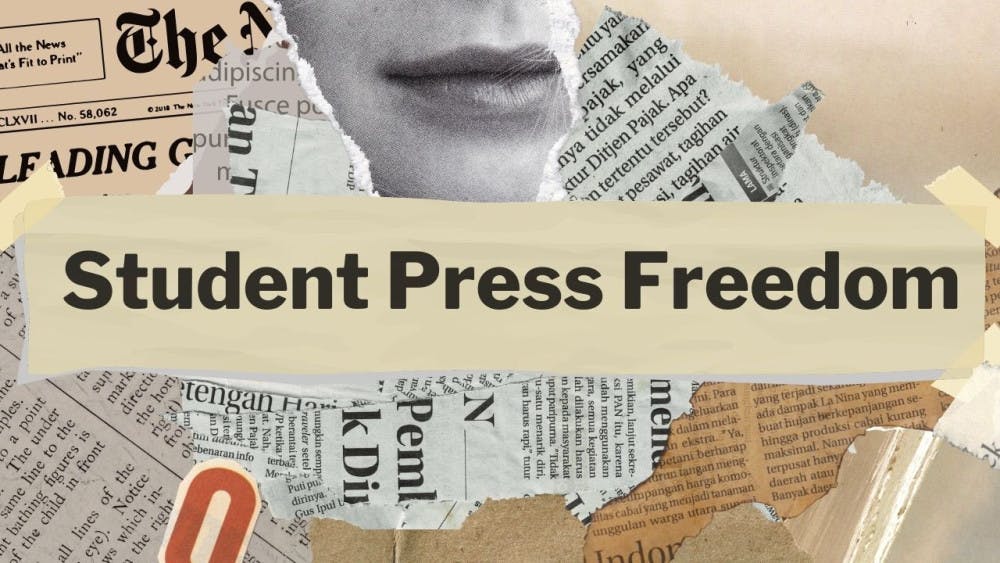Student Press Freedom | Graphic by Rose Taylor | The Wright State Guardian
Today is Student Press Freedom Day, which the Student Press Law Center created to protect the right to pursue journalism in the college setting. There are several different student papers across the Miami Valley and beyond that all operate in a different manner but serve the same purpose to inform the public.
The Guardian
The Guardian is a small student newspaper run by 15 to 20 Wright State University students. It encompasses both the Dayton and Lake campuses and mainly focuses on the WSU and the Miami Valley areas. Our Editor-in-Chief is Alexis Lewis, a senior English and French double major.
At the Guardian, our stories start with pitches. We all come up with a few for the sections under which we write. Then we take them to our planning meetings, which are generally on Wednesday, to present to the rest of the team.
After the meeting, we get in touch with sources and add photo notes for the photography team. We generally have until the next Thursday at 10 a.m. to submit our stories to the editors. Once the story goes to the editor, it goes through two or three rounds of editing before it is published.
The process from pitch to post takes about a week and a half to complete (barring any breaks or issues). The videographers, photographers and social media staff also work to curate their own content throughout the week.
Additionally, The Guardian also does a yearly magazine called Flight that is themed and written by several Guardian writers on top of their weekly writing. The Guardian also is in charge of the literary journal Nexus, which is fueled by creative submissions from staff and the WSU community.
The Guardian is far from the only student publication in the state of Ohio.
The Post
Katie Millard, a senior journalism major, is Editor-in-Chief for The Post, which is a student publication at Ohio University. The Post services the OU campus as well as the broader Athens and Ohio communities.
Unlike The Guardian, The Post runs on a crew of 300 student journalists. They have 11 sections that hold their meetings and choose what stories they pick up. They can produce daily content to go online while the crew works behind the scenes to put together a print copy of The Post.
“We have a very talented staff and rarely have notes—they know their sections best,” Millard said.
Millard explained that about 15 stories go out daily between 10 p.m. and midnight through their late-night process, which allows The Post to achieve its daily publishing goals.
The Northerner
Another student publication is The Northerner, which is a mainly-print publication that comes from Northern Kentucky University. Their Editor-in-Chief is Braden White, a senior journalism major.
The Northerner is a print publication that is released monthly. Each edition has a theme, and because of the nature of publication, The Northerner staff works to find the timeliest articles for their publication. They also have a website that reports daily news about the happenings that go on throughout campus.
The magazine is released on Wednesday in the middle of the month. White and a few other Northerner staff distribute the magazines across campus.
The importance of freedom of the press
Freedom of the press is an important right that we have in our constitution. It falls under the First Amendment along with the freedoms of speech and religion. These freedoms are considered core values of America. In that nature, freedom of the press is just as important.
“Freedom of [the] press is very important,” Robert Leonard, an instructor of communication at WSU, said. “It’s one of the ways that we as Americans can protect human rights.”
Leonard explained that without freedom of the press, important things would never be talked about.
“Things like Watergate, the Israel and Palestine conflict, Coronavirus. If there were restrictions on press coverage, these big issues would not be reported on,” Leonard said.
This goes for student publications as well. If these sources are censored and restricted, then there is a chance that students will not receive the news they need.
“Freedom of the press is crucial. It allows us to keep our community and university leaders in check and keep the public informed of what’s going on on campus and around town,” Millard said. “With free press comes democracy, and we are lucky to be a part of it.”
Many student publications are run independently from their institutions to maintain integrity of their reporting.
“We take being independent from the university seriously. We want our readers to know that we have news for them that they can trust. With so much going on in the world, it's important to have unbiased news,” White explained.
Student publications not only celebrate the good work of students or university faculty, but they also hold public bodies accountable and report on all forms of news that happens at the school, no matter the nature of the story. In this way, student media informs the community about news that would otherwise go unheard or unseen.
No matter how they are run, student publications are there for the students and communities of their respective universities to deliver important and up-to-date news.









